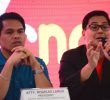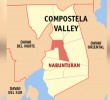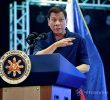*Statement of National Anti Poverty Commission Lead Convenor, Secretary Liza Maza, April 20, 2017
How society perceives poverty and the poor influence policy decisions and people’s initiative towards poverty eradication.
We cannot effectively fight poverty if we see the poor as lazy, uneducated, non-tax payers and thus, undeserving of public support. Often associated with criminal activities, they are shunned, unwanted.
The poor are working in the informal sector, industrial areas, and agricultural lands. They are ambulant vendors, factory workers, farmers, fisherfolks, who work more than our daily eight hours, and yet are still left with insufficient means to fend for themselves. In fact, our main food producers, the farmers and the fisherfolks, remain the poorest among the basic sectors of the society.
Hindi tamad ang mahihirap. Nagbabanat sila ng buto nang higit pa sa makakaya nila. Hindi nga lang sapat. Laging hindi sapat. Ang kailangan nila ay mga batayang serbisyong panlipunan katulad ng pagkain, disenteng pabahay na may kuryente at tubig, regular na trabaho na may nakabubuhay na sahod.
The failure of past administrations to look at poverty eradication in a more comprehensive perspective resulted in mere dole-outs such as the CCT or the Pantawid Pamilyang Pilipino Program (4Ps). These piece-meal approaches to poverty eradication were proven ineffective in addressing poverty at is roots.
Based on data from the Philippine Statistics Authority (PSA) released in October 2016, at least 20 million Filipinos are still poor. The minimum wage of P454 for agricultural and manufacturing workers, and P491 for the non-agricultural workers are still less than half of the P1,088 family living wage or the income needed to cover the basic needs of a family everyday, excluding the expenses for education and hospital emergencies (IBON). A family of five need at least P6,329, on average, monthly to meet the family’s basic food needs and at least P9,064, on average, monthly to meet both basic food and non-food needs (PSA).
Government figures indicate a 4.7% unemployment rate or 2 million unemployed in October 2016. This is a 14% decrease from the 2.4 million unemployed the same month last year. Also in October 2016, results showed an employment rate of 95.7% or 41.7 million employed, and underemployment rate of 18% or 7.5 million underemployed (PSA). Despite the decrease in the number of unemployed Filipinos, jobs that are part-time, insecure, with low wages, and lacking in benefits, are still prevalent (IBON).
The negative public sentiment, even among our lawmakers on the occupation of informal settlers of the government units in Pandi and a disputed vacant lot in Apollo, Tandang Sora, underscores the need to advance the discourse on poverty in the country.
Poverty is rooted in underdevelopment, inequality, and injustice. In a country with immense resources, we are unable to produce the goods and services needed by the people.
NAPC believes that the key to food security, sustainable agriculture, and rural development is a genuine agrarian reform that will finally put an end to land monopoly in the country side, distribute agricultural lands to landless farmers, and institutionalize a program of state support and subsidy in all aspects of agricultural production.
Genuine agrarian reform will also lay the foundation for national industrialization, which through
high technology capital-intensive production, will create more secure local employment with wages that can fully improve the standard of living.
The deprivation that the poor suffer from are far too complex and diverse to be defined by one – dimensional measures such as income.
Based on a multi-dimensional view of poverty and a universal rights-based approach to poverty eradication, NAPC, in consultation with the basic sectors has identified food and agrarian reform, water, shelter, education, healthcare, work, social protection, healthy environment, peace, and participation as the 10 basic needs of the poor.
It is only through the provision of these needs to poor Filipinos can we say that poverty in the country is history. ###










